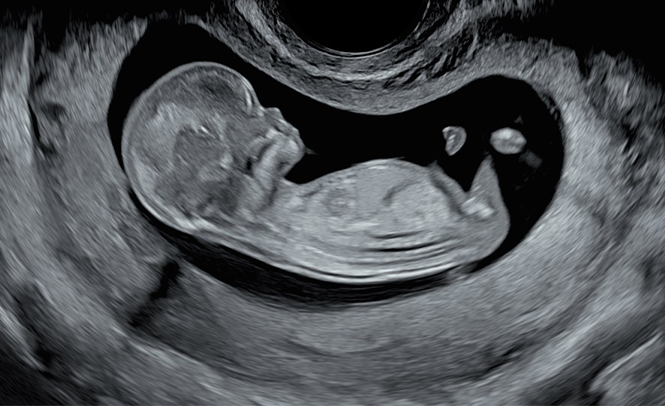Genetic Ultrasound: What is It?
A genetic ultrasound, sometimes called a focused or detailed ultrasound, is a specialized type of prenatal imaging. Unlike routine ultrasounds, which provide a general view of the baby’s development, a genetic ultrasound offers a closer and more detailed examination. Its primary goal is to assess the baby’s physical features for signs that could indicate genetic conditions or congenital abnormalities.
Medical professionals use this advanced imaging technique to look for subtle markers that might not be visible in a standard ultrasound. These could include specific facial features, heart structures, or limb measurements that might suggest a genetic issue. Because it’s more focused, a genetic ultrasound can be an important tool in guiding further testing and giving families a clearer understanding of their baby’s health.
This extra level of detail is especially valuable in high-risk pregnancies or when there’s a concern based on family history or other screening results. With this information, doctors and parents can make more informed decisions about the pregnancy and prepare for any special care the baby might need after birth.
The Purpose of Genetic Ultrasound:
Early prenatal genetic problem screening and diagnosis is the main objective of genetic ultrasonography. The procedure is usually carried out between weeks 18 and 22, which is an important time when numerous fetal structures are established and can be examined for anomalies. The following are some typical justifications for suggesting a genetic ultrasound:
- Advanced Maternal Age: Genetic ultrasonography is a crucial screening technique since women over 35 have a higher chance of giving birth to children who have genetic abnormalities.
- Results of Abnormal Prenatal Screening: A genetic ultrasound can offer more information if preliminary blood tests or non-invasive prenatal testing (NIPT) point to a greater likelihood of genetic disorders.
- Family History of Genetic Disorders: To closely monitor the development of the fetus, couples with a family history of genetic problems may choose to undergo genetic ultrasonography.
- Previous Pregnancy Affected by Genetic Disorders: Parents who experienced a genetically abnormal pregnancy in the past may choose to use genetic ultrasonography technology in their subsequent pregnancies.
During a Genetic Ultrasound: What to Expect?
A genetic ultrasound is a non-invasive procedure that uses high-frequency sound waves to create detailed images of a developing fetus. This specialized ultrasound goes beyond standard imaging, offering insights into potential genetic conditions or abnormalities. Typically conducted in the second trimester, it helps assess specific physical markers that might indicate chromosomal issues like Down syndrome. Parents often find this method reassuring because it provides a thorough look at their baby’s development without the risks associated with invasive procedures like amniocentesis. What parents can anticipate from the procedure is as follows:
- Preparation: Usually, a genetic ultrasound doesn't require any particular preparation. To enhance the clarity of the photos, parents could be advised to void their bladder.
- Procedure: A qualified sonographer or a specialist in maternal-fetal medicine does the ultrasound. To take pictures of the fetus, a transducer—a tiny, handheld device—is moved over the mother's abdomen after a gel has been applied.
- Image analysis: The fetus's organs, limbs, brain, spine, and facial features will all be captured in great detail by the sonographer. After that, these pictures are examined for any indications of structural or genetic problems.
- Outcomes: Generally, the genetic ultrasound's findings are communicated very away following the completion of the procedure. If anomalies are found, additional testing or guidance from a genetic counsellor can be suggested.
Benefits of Genetic Ultrasound:
Genetic ultrasonography is a useful technique in prenatal treatment because of its many advantages:
1. Early Detection: Parents and healthcare professionals can make educated decisions regarding the pregnancy and get ready for any necessary medical procedures when possible genetic abnormalities are identified early.
2. Peace of Mind: Knowing their child is developing healthily is a source of comfort and peace of mind for many parents, who receive a normal genetic ultrasound.
3. Personalized Care: Prenatal care and birth plans can be customized by medical professionals based on the results of genetic ultrasounds to suit the unique needs of the mother and child.
A significant achievement in prenatal care, genetic ultrasonography offers precise insight into the health and development of the fetus. It enables parents and healthcare professionals to take proactive measures in guaranteeing the best possible outcomes for mother and kid by discovering probable genetic anomalies early. With the knowledge and assurance that come with being a parent, embrace the adventure with the insights provided by genetic ultrasonography.
At LFMC, we understand that the journey through pregnancy is deeply personal and often filled with questions. That’s why we offer specialized genetic ultrasound services, delivered by a dedicated care team with expertise in fetal medicine. Our compassionate professionals are here to support you every step of the way, ensuring you receive the highest quality of care and attention. Your peace of mind is our priority, and we are committed to providing you with the information and support you need for a healthy pregnancy.

